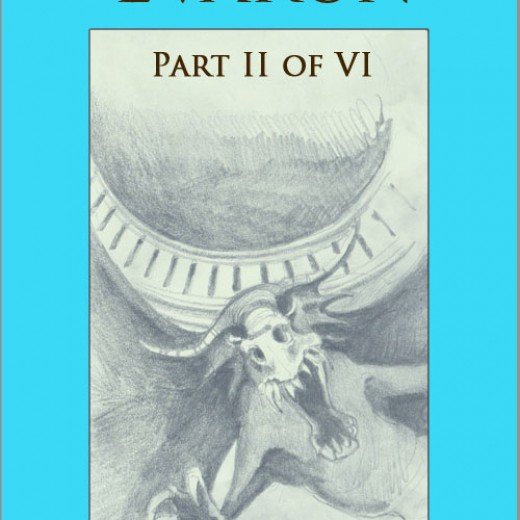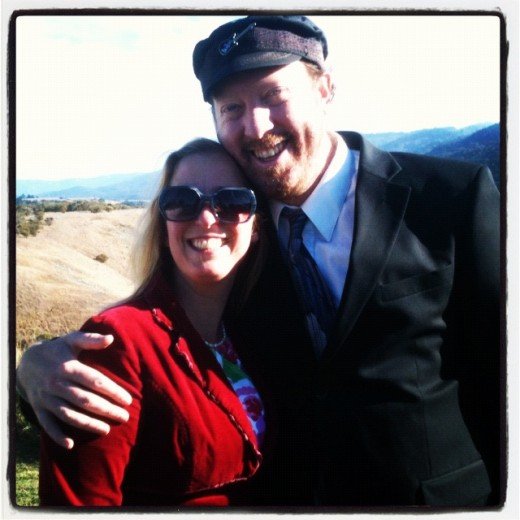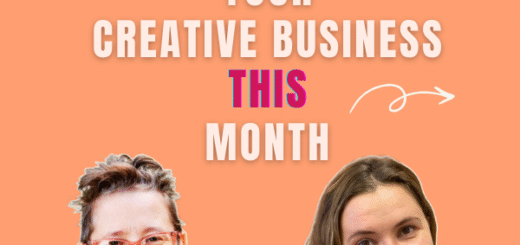Fiction Writing Tips: Overwhelmed with World Building? Start here.
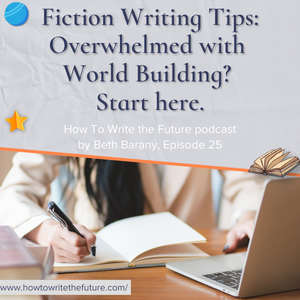 In this How To Write the Future podcast episode, Beth Barany shares Fiction Writing Tips and her perspective on how she guides writers feeling overwhelmed with their world building.
In this How To Write the Future podcast episode, Beth Barany shares Fiction Writing Tips and her perspective on how she guides writers feeling overwhelmed with their world building.
ABOUT BETH BARANY
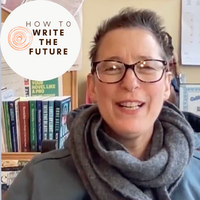 Beth Barany teaches science fiction and fantasy novelists how to write, edit, and publish their books as a coach, teacher, consultant, and developmental editor. She’s an award-winning fantasy and science fiction novelist and runs the podcast, “How To Write The Future.”
Beth Barany teaches science fiction and fantasy novelists how to write, edit, and publish their books as a coach, teacher, consultant, and developmental editor. She’s an award-winning fantasy and science fiction novelist and runs the podcast, “How To Write The Future.”
Learn more about Beth Barany at these sites:
Author site / Coaching site / School of Fiction / Writer’s Fun Zone blog
RESOURCES
Get support for your fiction writing by a novelist and writing teacher and coach. Schedule an exploratory call here and see if Beth can support you today:
https://writersfunzone.com/blog/discovery-call/
Sign up for the 30-minute Story Success Clinic here:
https://writersfunzone.com/blog/story-success-clinic/
SHOW NOTES
“For those of you who are more intuitive writers, I would say go with your gut, go with your intuition, and start by asking questions that are top of mind.”
In this episode of How To Write The Future, “Fiction Writing Tips: Overwhelmed with World Building? Start Here,” Beth Barany, creativity coach and science fiction and fantasy novelist, shares her perspective on how she guides writers who feel overwhelmed with their world building. She offers tips on how to start your world building with helpful writing exercises you can try.
This episode covers:
- Research is Fun
- Start Your World Building
- The Strength of Being A Fiction Writer
- About Making Stuff Up
TRANSCRIPT for Episode 25 Fiction Writing Tips: Overwhelmed with World Building? Start here.
Hi writers, Beth Barany here with How to Write the Future podcast. I am a writing teacher of science fiction and fantasy writers here to support you in building positive, optimistic futures. Because when we vision what is possible, we help make it so, and we vision through our stories, and those stories go into the hearts and minds of our readers.
And then our readers can envision a better world.
So how do you bring your story world alive?
From the moment your character appears on page one and all the way to the end, they are your ambassador to your story, to your story world, and to everything that happens, also to what has happened and what could happen.
Are you overwhelmed with world building for your stories?
Well, let’s break it down.
In my years of experience writing science fiction and fantasy, I have found That the strongest entry point for me to, to understand the world of my characters and the world of my story is through my characters.
I interview my main characters, even secondary characters, and including antagonists or the villain of the story to learn about my fantasy and science fiction worlds.
I do this in the form of journaling and interviewing my characters.
Now I always start with my main character, and if she does not know what I need to know, then I move to secondary characters. And if they do not know what I need to know, I move to minor characters. I sometimes even invent a new character, like an offscreen character who might never be in the story to ask them questions about the story world.
And sometimes those off-screen characters become on-screen characters through the process of interviewing them.
I recommend that you start with some world building exercises as I’m describing them to you before you start writing. But if you find yourself needing to know more about your story at any part of the process, whether it’s first drafting or revisions, then of course use these tools at that point as well.
Not all pieces of your story world that you brainstorm or come up with will end up in your story and, that’s totally okay.
A starting point is your main character and allow that to flow through you. And granted, I’m talking to people who are more intuitive writers. If you’re a writer who likes to plan everything ahead of time, then I would say start at the top of the list that I’ll be sharing in this course and move your way down.
For those of you who are more intuitive writers, I would say go with your gut, go with your intuition, and start by asking questions that are top of mind.
Research is Fun
Something I also notice is when I’m curious about a topic, really curious about it, I’ll be researching it on my off time and it will be fun for me.
So allow research to nurture the creative process and the writing process. If at any time you find that the research that you might be doing feels heavy and is bogging you down, then I recommend that you stop. Because this process, in my opinion, is meant to be fun.
So I wanna give you a little example about the research. In my young adult adventure fantasy, Henrietta the Dragon Slayer, I decided that she was trained as a blacksmith and a swordsmith. And why did I choose those things? Because I’m interested in those things. So I was able to do research in books and by visiting a local blacksmith, and that was so much fun.
So make sure the research is fun. Another example in my science fiction murder mystery series that takes place on space stations that I invent. I love watching space launches and learning about basic physics and learning about all the latest tools and technologies that we’re evolving to help us be a multi-planetary species.
So this is what I do for fun, and of course, it seeps into my storytelling.
So as I said, if research isn’t fun, then stop. Your enjoyment in the process is going to show on the page. So make sure it’s fun.
Start Your World Building
In this section, I’m going to talk to you about how to start your world building.
I do want to say that this process is a personal one, so each of you will discover, or has discovered, your own method of creating your story world.
Now, if you’re just starting out, I recommend that you use the process that I am explaining here, and as you move forward, you’ll discover how to make it your own.
You’ll tweak it, you’ll change it, and that’s great.
For those of you who have done a lot of world building, but want a refresher, then use what I’m offering here as a guide, and I trust that you’ll make it your own.
The Strength of Being A Fiction Writer
Now when you are world building, as I said earlier, you want to come from the perspective of your character.
I think this is one of the things that makes what I offer unique because I really think that designing your world is not a historian’s exercise. We’re not historians, we’re not professors. We’re not journalists. We’re fiction writers.
So where’s the strength of being a fiction writer? It’s in our characters, and this is my perspective.
I know not every writer writes in this way, but I really guide writers to start with their characters.
You need to know their own history, their own backstory as it relates to your story. And you need to know what they want and what motivates them, and what are the conflicts that you’re exploring in your story. That really is foundational.
That’s where you begin.
Once you know that, then from there you can flesh out your story world. And of course, you’re gonna include other characters and their relationships with your main character.
For some writers, I do this often, as I will have a spine of a plot, and I know the main elements of my plot according to the genre I’m writing.
And then from there, I ask myself: What are the things I need to know about my story world to make this come alive, to make it feel unique?
In the revision process, I use my critique partners’ questions and beta reader questions to continue to flesh out my story world.
One thing I do not do is use the list I’m providing in this course as something that I go through from the top all the way to the bottom.
I really go through just what I consider as important as I develop the story, write the story, and revise the story.
So use what is right for you.
If you’re a very intuitive writer, a pantser, you’re probably going to just pick and choose what’s right for you.
If you need a guide, then I do suggest to use the list. So really make it your own.
About Making Stuff Up
In this section, I want to talk about fantasy versus science fiction and making stuff up.
Though we can blur the lines between fantasy and science fiction, I like to make a distinction on how we make up stuff for each of these two genres.
Now, if you’re writing fantasy, you can make it all up and create a world that holds together, but it can be completely invented.
It doesn’t have to be based on anything that we know today, although it needs to be recognizable. And it needs to be logical and meaningful to your characters. If your world feels random and that’s not your intent, then you do need to figure out the why and the how of things in your fantasy world. And if you want to make up words, that’s great. Just make sure that your reader is not confused.
Now, if you’re writing science fiction, that in today’s writing, that usually implies that your world is based on some kind of scientific possibility. It doesn’t have to be based on logically today’s science. It could be based on science we think could exist.
Even though we don’t travel to the stars yet, we one day could. So make it plausible within the science of tomorrow.
There’s a lot of interesting science just in the laboratories now that their implications hint at a totally different reality than today.
Even though time travel is not something that we can do according to physics, it is something that is possible. So if you are making a science fiction time travel story, the science needs to feel sound. It doesn’t have to be based in today’s science in my opinion. It has to be based in science that could exist. I understand that a lot of science fiction works with today’s plausible science and a lot of science fiction in the past did that as well, but you can push the boundaries.
Write long and prosper.
Science fiction and fantasy writers, sign up for your No-Obligation Discovery Call and get clarity to your writing process and finish your book.
Loved this episode? Leave us a review and rating here: https://www.buzzsprout.com/2012061
or in your podcast home of choice.
CONNECT
Contact Beth: https://writersfunzone.com/blog/podcast/#contact
Email: beth@bethbarany.com
LinkedIn: https://www.linkedin.com/in/bethbarany/
CREDITS
EDITED WITH DESCRIPT: https://www.descript.com?lmref=_w1WCA
MUSIC: Uppbeat.io
DISTRIBUTED BY BUZZSPROUT: https://www.buzzsprout.com/?referrer_id=1994465
- SHOW PRODUCTION BY Beth Barany
- SHOW NOTES by Kerry-Ann McDade
For more “How To Write the Future” episodes, go here.
If you’d like to invite Beth onto your podcast, drop her a note here

